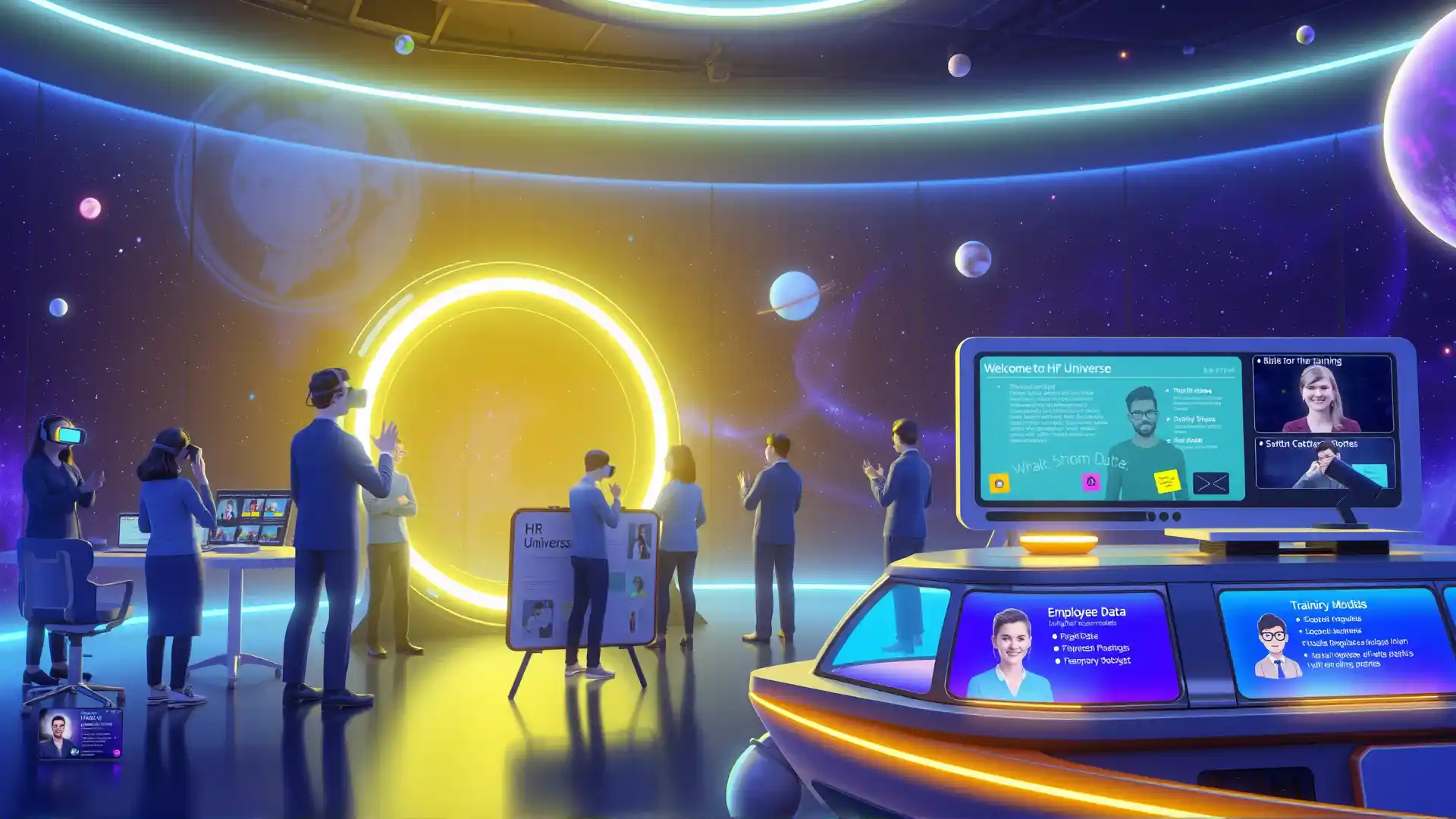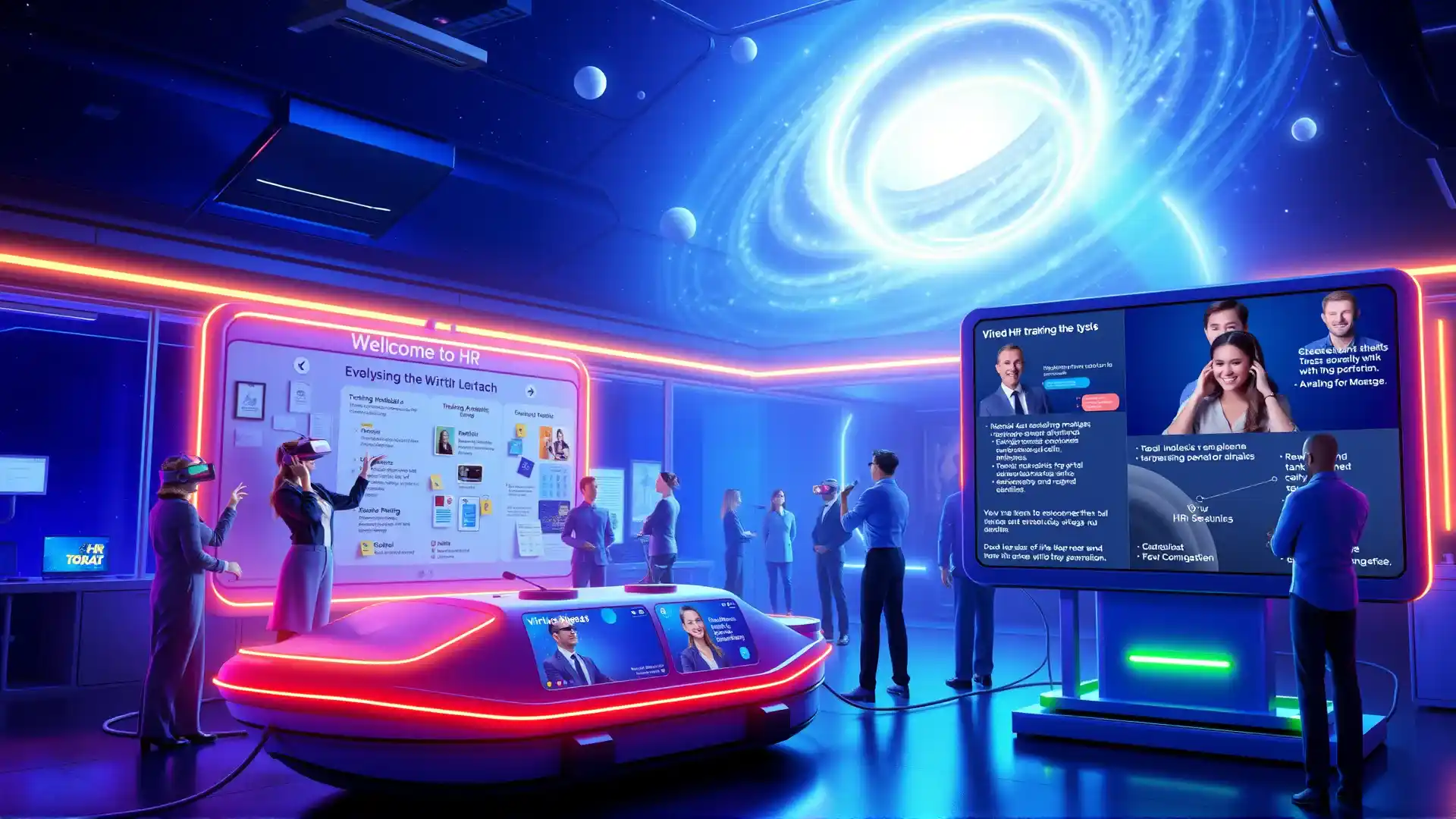Table of Contents
The traditional approach to HR has always balanced company needs with employee satisfaction within physical office spaces. However, the rapid shift to remote and hybrid work models—accelerated by the COVID-19 pandemic—forced HR departments to rethink their strategies.
This transformation revealed challenges in maintaining employee engagement, company culture, and effective communication in a distributed workforce by HR in the Metaverse.
The Challenge of Digital-First Workplaces
In a physical office, teams interact in spaces that foster collaboration, alignment with company culture, and a sense of community. But in remote or hybrid environments, maintaining those connections becomes a struggle. Digital communication tools like video calls and chat are helpful for task management but often fail to create a sense of belonging or a cohesive company culture.
Enhances HR Practices by HR in the Metaverse
- Virtual Recruitment and Onboarding: Recruitment is no longer limited to static job boards. The metaverse brings virtual recruitment events, immersive job previews, and VR-powered onboarding experiences. Candidates and new hires can engage with company culture firsthand, offering a more dynamic, insightful introduction to the role and organization.
- Interactive Training and Development: Training in the metaverse isn’t just about watching videos. VR simulations create hands-on experiences where employees can practice real-world scenarios—whether it’s customer service, leadership skills, or technical tasks—enhancing retention and engagement.
- Fostering Collaboration Across Distances: With virtual offices and meeting spaces, the metaverse bridges the gap between remote teams. Employees can engage face-to-face in immersive digital environments, collaborate in real-time, and strengthen interpersonal relationships despite physical distance. Virtual team-building activities further foster strong bonds, improving collaboration and company culture.

Benefits of HR in the Metaverse
- Enhanced Employee Engagement: The immersive nature of the metaverse captures employees’ attention, encouraging deeper interactions, creative collaboration, and innovation.
- Global Talent Pool: By eliminating geographical barriers, HR can tap into diverse talent from around the world, creating a dynamic and multicultural workforce.
- Streamlined Onboarding and Training: The metaverse offers interactive, self-guided onboarding and training, making learning both engaging and efficient. New hires gain immediate immersion in company culture while mastering their roles faster.
- Promoting Diversity and Inclusion: The metaverse is an inclusive space where employees from diverse backgrounds can interact and collaborate without physical constraints, fostering a sense of belonging and enhancing workplace diversity.
- Flexible Work Practices: The metaverse supports flexible schedules and remote collaboration, empowering employees to work in ways that suit their needs while promoting work-life balance.
Fostering a Culture of Innovation and Learning
- Continuous Learning: In today’s rapidly changing world, the metaverse enables continuous learning by providing immersive, interactive training opportunities. Employees can participate in virtual workshops and global conferences, enhancing their skills in a hands-on, engaging way.
- Enhancing Creativity: The metaverse fosters creativity by offering employees realistic simulations where they can experiment, learn, and innovate without the constraints of traditional environments.
- Cross-functional Collaboration: Virtual spaces encourage cross-team collaboration, allowing employees from different departments to brainstorm, solve problems, and innovate together, driving business growth.
- Building a Growth Mindset: By embracing the metaverse for training and development, organizations create a culture of adaptability and forward-thinking, helping both employees and businesses thrive.

Leverage of HR in the Metaverse
- Virtual Recruitment: Host immersive virtual job fairs, conduct interactive interviews, and offer 3D company tours to provide a richer candidate experience.
- Training Simulations: Use VR to create realistic, hands-on training experiences—ideal for developing soft skills, technical expertise, and leadership abilities.
- Virtual Team Building: Design virtual team-building activities to strengthen collaboration and connection among remote teams.
- Digital Workspaces: Create VR-powered virtual offices that replicate the experience of a physical workspace, enabling seamless communication and collaboration.
Moving Forward: The Metaverse and the Future of HR
The metaverse presents HR departments with a powerful opportunity to reshape employee engagement, training, and company culture. Embracing these immersive technologies allows HR professionals to offer employees unique, interactive experiences that support continuous learning and collaboration of HR in the Metaverse.
As organizations increasingly adopt remote and hybrid work models, integrating the metaverse into HR processes will be crucial for staying competitive. It’s more than just a technological shift—it’s a complete reimagining of how HR can meet the needs of a modern workforce.
By adopting the metaverse, HR can future-proof their operations, creating a more engaging, inclusive, and agile work environment that supports both employee growth and organizational success.
FAQs
What is the metaverse in HR?
The metaverse in HR refers to using virtual reality (VR), augmented reality (AR), and AI to create immersive digital environments for recruitment, training, and collaboration.
How can the metaverse enhance employee engagement?
The metaverse fosters deeper engagement through interactive experiences like VR training, virtual team-building, and immersive collaboration tools.
What are the benefits of virtual recruitment in the metaverse?
Virtual recruitment offers immersive job fairs, interactive interviews, and 3D company tours, providing candidates with a firsthand experience of company culture.